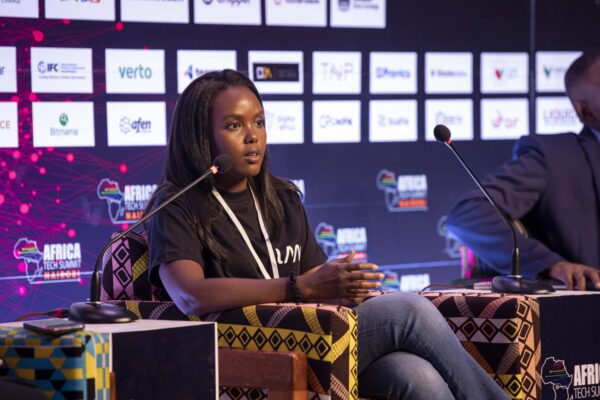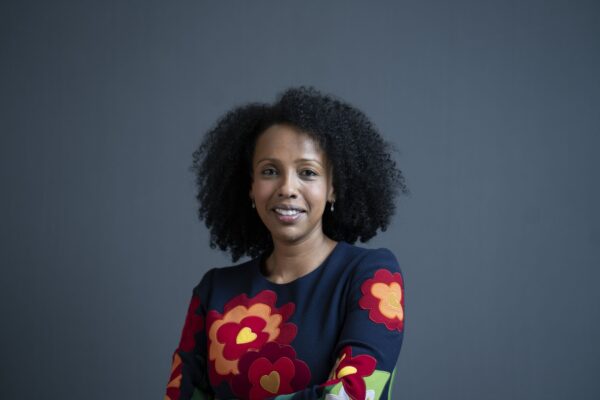By Samuel Gebre, Bella Genga, Katarina Hoije and Archana Narayanan
Africa’s female entrepreneurs, like their U.S. and European counterparts, are underrepresented when it comes to raising funds. Their start-up journeys are also often a lot more arduous, say investors like Polo Leteka, co-founder of Alitheia IDF, the continent’s largest gender-led fund.

The issues are “probably more pronounced here because we have more underlying problems,” said Leteka, pointing to her own experience with tapping investors for funds. “There was this mentality that African women are just supposed to sell tomatoes on the side of the road.”
While surmounting such stereotypes is getting easier, huge barriers remain. For every $1 invested in women, $25 goes to men in the African startup space, according to the World Bank.

Companies founded or co-founded by African women — many with international alliances, networks and operations — drew 16% of the total $5.2 billion raised on the continent last year by startups, according to data from Partech. That compares with 14.7% of the pie in the U.S. and 13.6% in Europe, Pitchbook data show.
The numbers, however, don’t capture the challenges of purely home-grown companies started by African women and the cultural barriers they face, entrepreneurs and fund managers say. One research showed that when startups make pitches, men get asked to speak about the opportunity of their business while women are asked about the risks and their plans to have children. The men usually get the funding.
Take Jihan Abass, the founder and chief executive officer of Lami Insurance Technology, a digital platform for financial services in Kenya and parts of sub-Saharan Africa. Abass, 28, grew up in Mombasa and worked as a commodities trader in London for Toyota before starting her firm.
“I had to show a lot more compared to what I heard my male counterparts were expected to show,” she said in an interview. “During the fund-raising process, you see other people who have less revenue, fewer partners or whatever metric it is, but they raise more money at a higher valuation; of course it is offensive.”
Lami, which announced a year ago that it had raised $1.8 million, is doing a new round of funding — relying primarily on women investors.
“The lead investor who found us and invested in us last year was a woman and the person working with her on the deal was also a woman,” Abass said. “The same thing this time. The more women you have, the more likelihood of them finding other women to invest in.”
The push to groom more women entrepreneurs has spawned a new breed of gender-focused funds in Africa. When Leteka started out in 2007, she was the first and only women-owned private equity firm in South Africa, and was partly able to raise money because of the government’s drive to include more women in the economy. Since then other such funds have sprouted across Africa.
“I recognized it was really difficult for women to access capital,” said Lisa Thomas, who is raising $35 million for a gender-lensed African fund called Samata Capital. She and other female fund managers have come together to create a pan-African network of over 70 women to seek out deals and support entrepreneurs.
“If women or half of the founders are being left out, then that is an arbitrage opportunity for me because we will find those diamonds in the rough, we will support them and they will outperform everybody else,” Thomas says.
Governments are trying to do their bit, with countries like South Africa, Tanzania and Kenya prioritizing women suppliers in some of their public procurements. But broader hurdles to funding projects often drive women away, especially if they are just starting out.
“There are fewer women coming through the ecosystem,” said Natalie Kolbe, Managing Partner of Norrsken22, an Africa-focused fund started by a Swedish tech startup, which expects to raise $200 million or more this year. “There is capital available but the ecosystem is not producing women entrepreneurs.”
Consider Anna Njoroge in Nairobi, founder of an African skin and hair products startup called Ythera Beauty, who says “accessing long-term financing is a struggle” for entrepreneurs like her.
“A lot of private equity want to fund deals starting maybe from about $3 million,” she said. “You have a lot of small businesses that may need $15,000 or $100,000, half a million dollars until they get to the next level.” Njoroge, who expanded into the US in December, is having to self fund her business.
One issue hurting women founders is the investor focus on the tech space, which is where a majority of African Unicorns are emerging, says Jessica Espinoza, CEO of the 2X Collaborative, an industry body for gender-focused investing.
“This isn’t necessarily the sector where female founders are,” she said. “As an investor, if you want to fund women-led startups, you might need to look to other sectors such as healthcare and reproductive care.”
Still, when they are in a tech-related sector, women entrepreneurs thrive. Last year, Gro Intelligence, a Nairobi and New York-based provider of artificial-intelligence driven real-time agriculture and climate updates raised $85 million. Its founder is Sara Menker, an Ethiopian who was a former Wall Street commodities trader.
“The primary driver and why we decided to invest was the founder,” said Eghosa Omoigui, managing general partner of EchoVC Partners. “Sara is a force of nature. She came into our office 5 1/2 years ago to pitch us her vision on Gro. A scheduled one-hour long meeting turned into 2 1/2 hours. Later we met in New York. That meeting crystallized what founders want to back and what I call WOW — With or Without — that is founders who will succeed with or without you as an investor.”
But stories like Menker’s are rare. For most women entrepreneurs, drawing the attention of the wider pools of funds remains a challenge.
“Women are judged by what they’ve done in the past solely while men are being judged by what they say they’ll do in the future,” said Tokunboh Ishmael at Alitheia Capital, who launched a $100 million gender-investment fund. “Even in cases where I’ve trained male colleagues in this industry, I would be judged as less capable than those same colleagues.”
Marie Stavelot, a Belgium-born Congolese luxury resale aggregator based in Dubai, tells a similar tale. Stavelot, who founded her company, Reluxable, in December 2020 and launched her platform this year, is looking for about $1 million for the next 16 months to expand her business. The luxury second-hand market is growing, and her sales have been rising. After self-funding operations through her savings and help from her mother, she reached out to more than 200 venture capitalists globally — with no success.
“There are always suggestions saying you want to try an accelerator program, mentorship and things like that, but why? I am an entrepreneur like any other male entrepreneur,” said the London-educated former bank credit analyst.
More stories like this are available on bloomberg.com.




